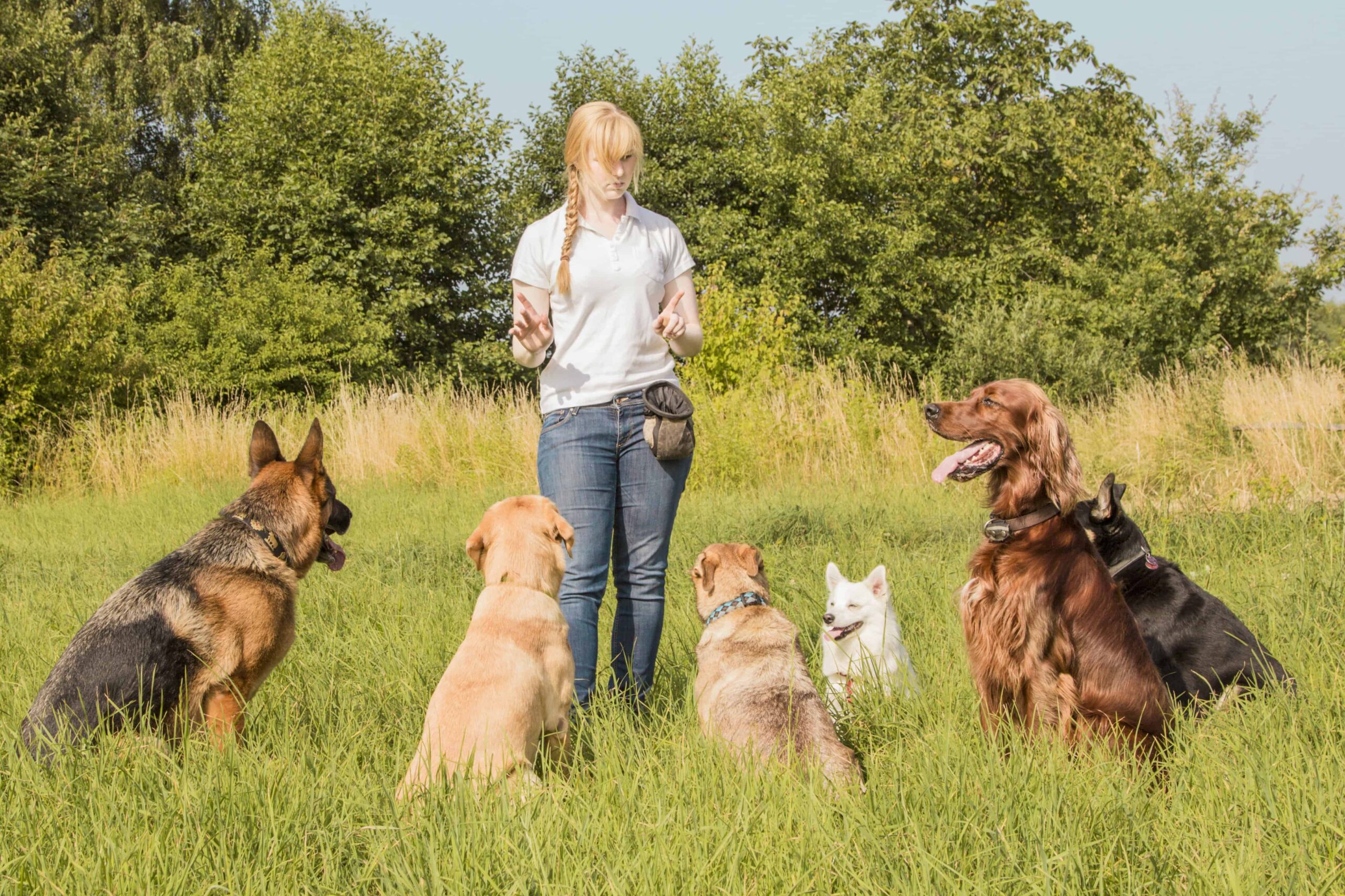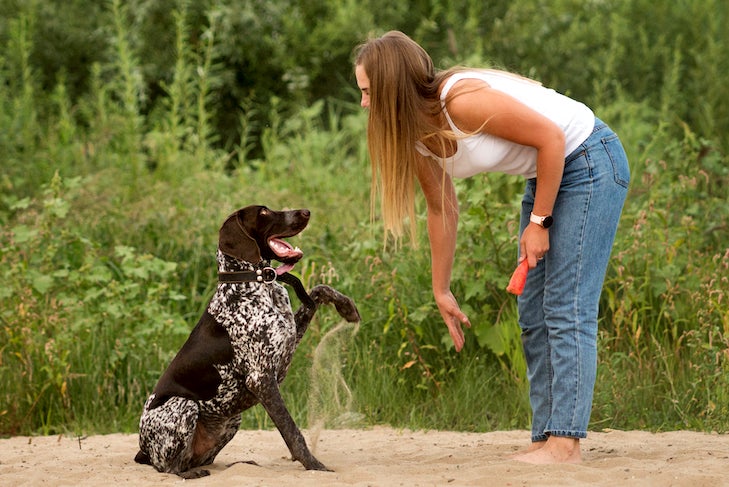Unleash Potential with Dog Training Near Me: Find Your Local Specialists
Unlock Your Canine's Possible: Proven Canine Training Methods for Success
Reliable dog training is a nuanced procedure that pivots on recognizing canine behavior and utilizing clinically backed strategies. By integrating favorable reinforcement, developing clear commands, and focusing on socializing, pet owners can cultivate an efficient connection with their pet dogs.
Recognizing Pet Dog Behavior
Comprehending dog actions is essential for reliable training and promoting a favorable relationship between canines and their owners. A detailed grasp of canine body movement, vocalizations, and social communications is important for identifying their demands and feelings. Pet dogs connect mostly via non-verbal signs; for instance, a wagging tail might indicate enjoyment, while pinned ears can signal anxiety or submission.

Moreover, environmental aspects play a significant function in shaping a canine's actions. Adjustments in routine, brand-new environments, or the presence of unfamiliar people can result in anxiety or stress and anxiety in pets. Identifying these triggers allows owners to reduce unfavorable reactions and develop ideal training strategies.
Inevitably, a deep understanding of dog habits lays the foundation for successful training techniques, boosting both behavior and the total bond between the pet and its owner. dog training charlotte nc. This understanding is essential for cultivating a well-adjusted, pleased canine companion
Positive Reinforcement Techniques
Reliable training depends greatly on positive reinforcement strategies, which have been revealed to produce considerable lead to shaping wanted actions in pets. This method includes rewarding a dog for showing details habits, thus enhancing the likelihood that these actions will be repeated. Benefits can take various types, consisting of deals with, praise, playthings, or playtime, depending upon what inspires the private canine.

It is important to gradually terminate benefits as the dog discovers the behavior, transitioning to recurring support. This strategy keeps the habits over time while stopping reliance on constant incentives. By concentrating on positive reinforcement, trainers can grow a trusting connection with their dogs, advertising a healthy and participating training setting that improves total obedience and performance.
Developing Consistent Commands
An essential facet of successful dog training is the establishment of constant commands. Uniformity in commands is vital for effective interaction between the canine and the fitness instructor. When commands are consistent, pets learn to link particular words with wanted habits, which accelerates the training procedure and boosts understanding.
To develop constant commands, it is crucial that all member of the family use the exact same terminology and gestures. For instance, if someone utilizes "rest" while another says "take a seat," it can develop confusion for the canine. Select clear, distinct words for commands and guarantee everybody included in the pet's training complies with these choices.
Strengthen commands through constant practice, guaranteeing that the pet obtains sufficient opportunities to respond appropriately. When a pet efficiently complies with a command, instant positive support needs to get more comply with.
Finally, hold your horses. Establishing consistent commands takes time and initiative. With commitment and clarity, you will certainly aid your pet dog establish a solid understanding of assumptions, eventually causing a well-behaved friend.
Socializing and Exposure
Socializing a pet is crucial for cultivating a well-adjusted and positive friend. This process entails subjecting your dog to a range of environments, individuals, and other pets to develop their social abilities and adaptability. Early socializing, preferably in between the ages of three to fourteen weeks, is essential, as it prepares for a pet's future behavior.
During socializing, aim to provide favorable experiences in various settings, such as parks, active streets, and homes with various other pets. Introduce your pet to various stimulations, consisting of sounds, views, and scents, making sure that each experience is gratifying. This direct exposure helps reduce anxiety and stress and anxiety, leading the way for a much more resistant canine.
Participating in regulated group play sessions with other pet dogs can additionally enhance social abilities, educating your animal appropriate communications and borders. Constantly monitor your canine's convenience level during these experiences, slowly increasing exposure as their confidence expands. Bear in mind, the goal is to produce an all-around family pet that grows in diverse situations, promoting an unified partnership with both human beings and other animals. Focusing on socialization will dramatically add to your canine's general joy and habits throughout their life.
Conquering Common Educating Difficulties

Another frequent problem is distraction. Pet dogs may have a hard time to concentrate in busy or unknown settings. Slowly desensitize your dog to disturbances by starting training in a peaceful atmosphere and gradually introducing more stimuli as they end up being proficient (dog training dig this charlotte). Positive reinforcement methods, such as deals with and appreciation, can keep motivation and focus.
Furthermore, behavior concerns like leaping or extreme barking can become frustrating. Address these by educating alternate behaviors, such as sitting steadly when welcoming visitors. Consistency and patience are essential; strengthen preferred habits consistently and prevent scolding, which can cause confusion.
Lastly, recognize that each dog is unique, and training timelines might differ. Dressmaker your strategy to your pet dog's specific requirements, and seek professional guidance if necessary. With willpower and the appropriate methods, getting rid of these difficulties can result in a well-trained, pleased canine companion.
Verdict
In verdict, unlocking a dog's possible requires an extensive approach that includes an understanding of canine habits, the application of positive support techniques, and the facility of constant commands. Early socialization and direct exposure to diverse settings additionally enhance a pet's versatility and self-confidence. By attending to common training obstacles with tailored approaches and persistence, a harmonious and participating connection in between canine and trainer can be promoted, ultimately causing a well-behaved buddy capable of growing in different situations.
Effective pet dog training is a nuanced process that hinges on recognizing canine behavior check my reference and using scientifically backed approaches.Comprehending pet dog behavior is important for efficient training and fostering a favorable partnership between pets and their owners.Efficient training relies heavily on favorable reinforcement methods, which have actually been revealed to yield considerable outcomes in forming desired behaviors in canines. When commands are consistent, canines discover to link particular words with preferred actions, which accelerates the training process and improves understanding.
In verdict, unlocking a canine's prospective demands a detailed strategy that integrates an understanding of canine habits, the application of favorable support strategies, and the establishment of consistent commands.